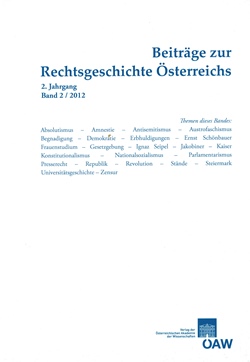
Beiträge zur Rechtsgeschichte Österreichs 2 / 2012, pp. 250-262, 2012/12/20

The universities did not remain unaffected by the social and cultural transformations of the First World War. Thewomen's movement had already secured access for women to the Faculties of Philosophy and Medicine at the Habsburguniversities (1897 and 1900 respectively), but the Law Faculty still remained closed to them - as did Theology.The war not only gave the women's movement a boost but also showed that there was a need (although mostly only'apparent' in very specific areas) for legally educated females, for example in welfare, youth welfare in particular.The women's associations backed up their claims to equal rights with references not just to the constitution but alsoto the idea of culture: they contended that it was unworthy of a 'Kulturstaat' such as Austria-Hungary not to allowits women access to education when it had become the norm elsewhere. Since 1871 in particular, Austria-Hungaryhad sought to represent itself as a 'Kulturstaat' (cultured state), in contrast to the Prussian 'Machtstaat' (powerstate). Above all, the Viennese Professor for Constitutional and Administrative Law, Edmund Bernatzik, supportedby his daughter Marie Hafferl-Bernatzik, petitioned alongside the women's associations for women to be admitted tothe study of law. The struggle over the law faculties as male bastions was intimately connected to the progression ofthe war for Austria-Hungary. Jurisprudence had always been an integral part of the governmental system: the titleDoctor iuris was a necessary prerequisite for any position in the higher echelons of the Austrian civil service wellinto the twentieth century, and most influential politicians generally came from the ranks of law graduates. Accessto knowledge about the law and the state was therefore a direct qualification to act in and on the law and the state.This action became all the more significant as the Habsburg Monarchy gradually disintegrated. Political consequenceswere not drawn from the accelerated social change until the upheaval of 1918/19, when the law facultieswere also finally opened to women.